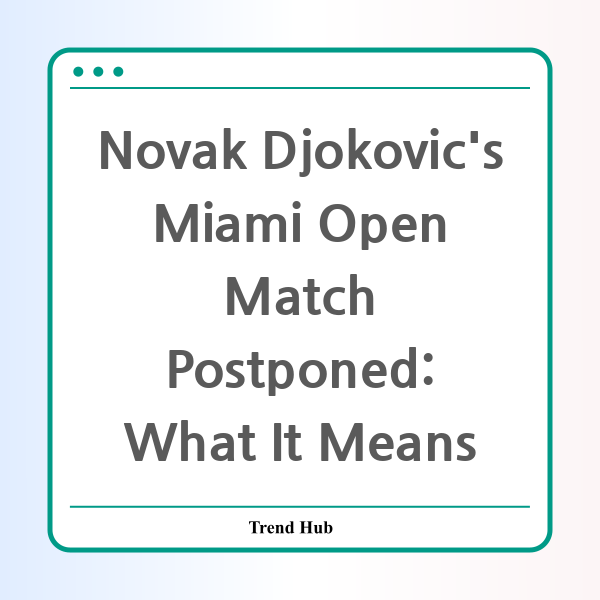* This website participates in the Amazon Affiliate Program and earns from qualifying purchases.

In a surprising turn of events during the Miami Open, tennis fans were left disappointed as the highly anticipated quarterfinal match between Novak Djokovic and Sebastian Korda was postponed due to the enforcement of a new ATP rule aimed at preventing late finishes. This decision comes after a series of matches ran late into the night, sparking discussions about scheduling practices in the sport.
The Miami Open, which took place at the iconic Hard Rock Stadium, had an exciting lineup on March 26, 2025. However, a rain delay the day before pushed matches onto a tight schedule, leading to a domino effect that resulted in delays. Fans packed the stadium to see Djokovic, a tennis legend, take on rising star Korda, but as the clock ticked past 11 p.m. and after several thrilling matches, the organizers made the call to postpone the Djokovic-Korda match.
The decision, made by event host Andrew Krasny, was met with audible discontent from the crowd, who had already invested a significant amount of time watching tennis that day. Many spectators had hoped to see Djokovic play, but the ATP's rule clearly stated that no matches could begin after 11 p.m. unless under special approval. This was a moment where common sense seemingly prevailed, providing relief for both players and fans who might have faced a grueling night ahead should the match have continued.
The buildup to this rule's implementation had been a long time coming, as matches in previous tournaments often stretched well past midnight, leading to both player fatigue and diminishing viewing experiences for fans. The ATP and WTA introduced this rule to create a more favorable and logical schedule for all involved. While it might seem frustrating for fans who were eager for Djokovic’s performance, the importance of player health and welfare is paramount.
Despite the disruption, the Miami Open displayed several riveting matches throughout the day. In particular, Jessica Pegula and Emma Raducanu engaged in a thrilling contest that extended well into the late hours, with Pegula emerging victorious. The marathon matches, including Grigor Dimitrov's hard-fought victory over Francisco Cerundolo, contributed to the schedule backlog that ultimately led to Djokovic's match being postponed.
The postponement raises questions about how the Miami Open organizers plan to manage the schedule moving forward. With the same number of matches scheduled for the next day, there are concerns that similar delays could occur, especially if none of the matches are moved to alternate courts. Observers have noted that flexibility in scheduling could help avoid further complications.
With a packed audience eager to see Djokovic in action, the question remains: how will the Miami Open balance a fair and timely schedule while still providing fans with the entertainment they crave? As we await Thursday's action, all eyes will be on Djokovic as he takes on Korda in what promises to be an electrifying encounter.
In conclusion, while the delayed match may have left fans feeling frustrated, it also highlights the ATP's commitment to ensuring that players are not pushed beyond their limits in pursuit of a more spectator-friendly environment. As the tournament progresses, it's imperative for organizers to learn from these incidents to optimize scheduling in future events, allowing both players and fans to enjoy the magic of tennis without running into the early hours of the morning.
* This website participates in the Amazon Affiliate Program and earns from qualifying purchases.